MFA in Classical, Studio, Contemporary Conducting and Related Recording Technologies
A one-year intensive programme designed for conductors who need regular podium time with professional ensembles across a variety of styles. Accredited by the Middle States Commission on Higher Education. Internationally recognised. 54 credits.
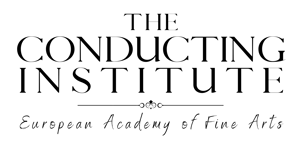
The Ultimate One-Year Practical Experience for the Modern Conductor
Modern conducting is a demanding profession that requires versatility. The industry expects you to be adaptable and efficient in the studio, demonstrate musicianship that transcends genres, and boast technical proficiency combined with business acumen. This one-year, intensive programme bridges the gap between tradition and innovation, equipping you with the cutting-edge skills and artistic vision to thrive in this multifaceted profession.
Limited podium time, amateur ensembles and lack of training across styles holding back your conducting career?
This MFA programme tackles those problems by offering an unparalleled 30 minutes of regular podium time with the Vratsa Symphony Orchestra in professional settings with classes delivered in Sofia, Vratsa and Vienna. Our experienced faculty will guide you every step of the way, culminating in a fully produced professional concert. You'll graduate with the tools to realise and produce your artistic vision, collaborate and communicate effectively within a team and adapt to musically challenging circumstances – all while building a standout portfolio that showcases your skills in action.

Weekly Podium Time
Enjoy 30 minutes of podium time per week with the Vratsa Symphony Orchestra and other professional ensembles.

10 Modules
Including Symphonic, Concerto, Studio, Orchestra, Film, Big Band, Ballet, Music Technology, Career Development and more.

Personal Mentorship
Exposure to our leading professionals specialising in specific areas of conducting.
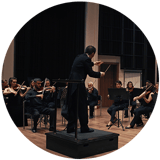
Portfolio Building
4K video and audio files of your concert to showcase your skills in action.
Module 1: Fundamentals of Symphonic Conducting Technique
The universal language of gesture. Candidates pursue bespoke individual conducting studies at the Conservatory with distinguished resident and visiting conductors. With an emphasis on refining performance practice, artistry and technique, and developing and improving interpretive skills through consideration, reflection and the application of current practice styles across a broad range of symphonic conducting repertoire from the Baroque through the 20th Century periods.
Module 2: Studio Conducting and Conducting in Rock/Pop Environment
Versatility. Enabling conductors to be effective communicators through practical experiences of conducting in both the recording studio and in rock/pop environments. Training in working with studio techniques, including click tracks, streamers, conducting to picture, rhythm sections, pre-recorded tracking, monitor mixes, and interaction with producers and engineers.
Module 3: Concerto Conducting
Learn to apply the vastly different listening techniques required for concerto conducting, facilitating those places in the music whereby following the soloist is of the utmost importance. Intuitive interaction and prediction of the soloist's intentions before the event happens is a primary skill requirement, and can only be learned through regular practical experience.
Module 4: Career Development, Promotion and Programming
One of the most important elements of any University or Conservatory education is almost always forgotten. Students leave programs all over the world with facility on their instruments, yet completely ill-equipped to navigate the business aspects of their professional lives. Without self-leadership and entrepreneurial skills, musicians find themselves fixated on finding opportunities that will 'make' their careers rather than understanding the tools needed to create those same opportunities to build career advancement. (A portion of this module will be delivered in Vienna)
Module 5: Media Recording, Editing, Mixing, Videography and Music Technology
Modern conductors should have a command of current music technologies, primarily the current DAWs (Digital Audio Workstations), and an understanding of the methodologies, processes and workflow applications required to effectively and professionally record, edit and mix the orchestra and other performing ensembles. Conductors must become their own recording engineer, music editor and mixing engineer, and will receive thorough instruction on the complete process of audio and video recording of any ensemble, as well as the editing and mixing of the music recorded therein.
Module 6: Musicals, Live Orchestra to Film, Contemporary Dance and Classical Ballet
Modern presenters find themselves increasingly programming works for film and game visual content accompanied by live orchestra. There is a particular skill set required to lead an orchestra in sync with on-screen visual images effectively. Musicals, Contemporary Dance and Classical Ballet all require different attention and focus on rhythmic elements than in other Classical genres.
Module 7: Conducting Beyond the Concert Hall
Conductors are increasingly required to conduct in settings outside of the concert hall. This involves a totally different set of musical responsibilities i.e modern conductors should be flexible across varying domains such as Film Music sometimes combining instrumental and choral cues where they are expected to understand optimizing workflows, in a studio environment, to achieve the best result possible within the time limitations imposed upon them. Unlike conducting instrumental cues in this setting, conductors should be skilled directing small vocal ensembles for the purpose of creating prelays or overdubs.
Module 8: Big Band
Experience regular rehearsals and exposure to big bands and jazz ensembles in order to learn this completely different vocabulary thoroughly. The conductor's role is vastly different in this setting; learn how to interact with rhythm sections and the gestural vocabulary to run big band rehearsals and performances.
Module 9: Opera Conducting
Opera conducting is a specialized skill set within the overall conducting musical language. It utilizes many of the gestures developed in the symphonic language coupled with gestures that are specific to the opera stage. Amongst them are maintaining the attention of the singers to the focal point of the conductor's podium in the pit, indicating entries to the singers that are pre-empted with additional gestures that allow for time for the singers to breathe, and much more.
Module 10: Major Conducting Project
Conduct a concert performance or studio recording of the following: symphonic repertoire, opera/ballet, musical, film/game, big band and pop/rock live show with the orchestra. This performance or studio recording will be professionally HD video and audio recorded so conductors can have high-quality content for their portfolios.
Rehearse. Refine. Conduct.
Your vision is our mission. Master conducting beyond traditional repertoire. Adapt to a variety of settings: Studio, Live Orchestra to Film, Big Band, Symphonic, Opera, Rock/Pop and Video Game Music. Receive immediate feedback via video recordings. Collaborate with mentors to refine your technique and apply your skills to a professional orchestra. Every week.
Weekly Podium Time
Access year-round conducting opportunities with one of Bulgaria’s finest orchestras and world-class soloists. Supported by specialised faculty, professional recording engineers and videographers. Feel the richness of the Vratsa Municipal Hall and experience the industry-leading Doli Media Studios in Sofia.
Study with Experienced Conducting Faculty
Our conducting faculty boasts extensive professional experience and a history of high profile international performances, integrating their expertise into their teaching methods. With a wealth of educational backgrounds, they combine practical insights with pedagogical excellence, fostering a dynamic and comprehensive learning environment.
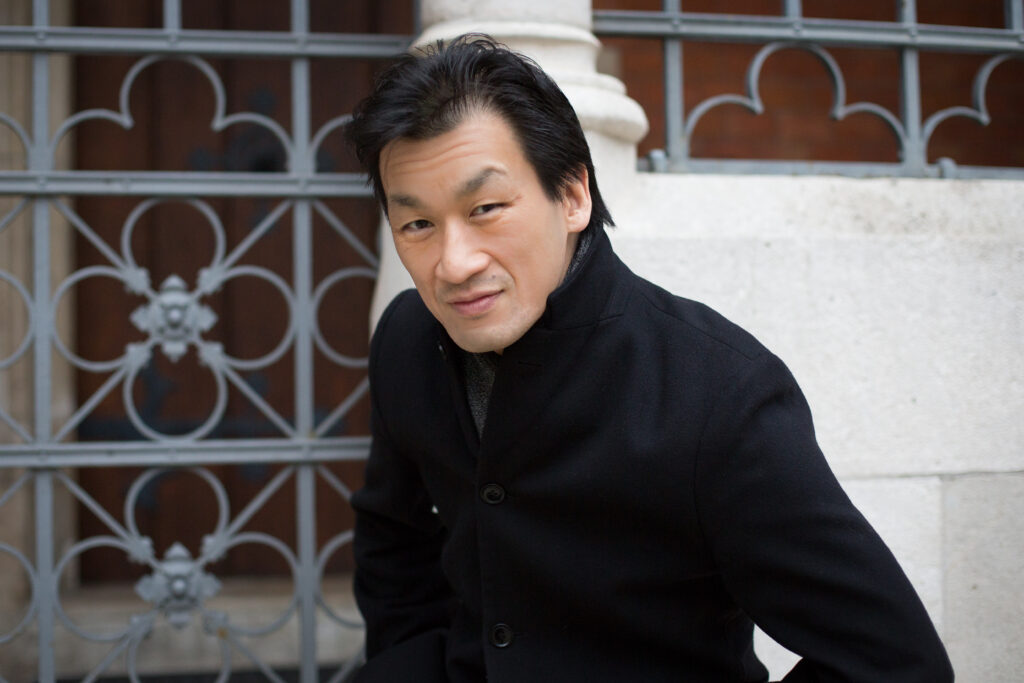
Malcolm Yuen
Programme Director
Music Director of the Irish Chamber Ensemble and Juror Wiener Musikseminar
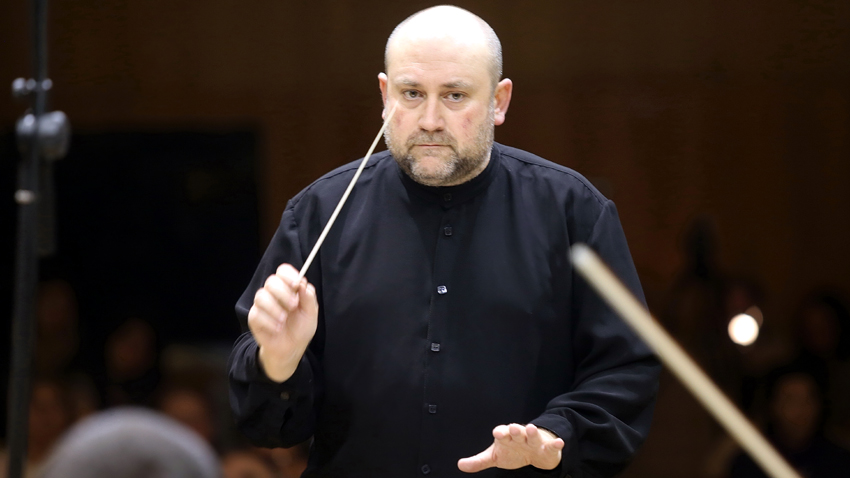
Christo Pavlov
Conducting Faculty
Music Director of the Vratsa Symphony Orchestra
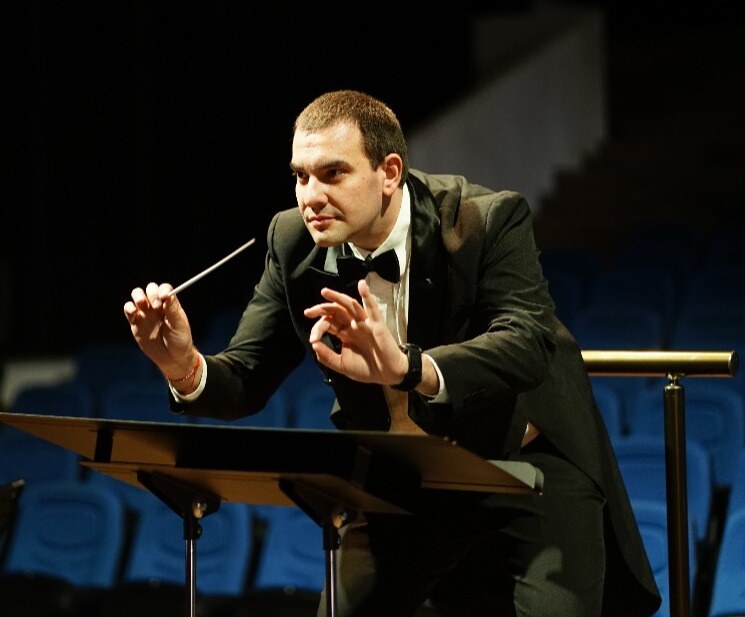
Nikola Petrov
Conducting Faculty
Accomplished Bulgarian Studio and Classical Conductor, Orchestrator, Score Supervisor and Classical Percussionist
3 Scholarship Opportunities
Up to three merit-based scholarships will be awarded to qualifying conductors as determined by the Admissions Board. There's no need for additional scholarship applications—all accepted students are automatically considered.
Nayden Todorov Scholarship
€3,000
Awarded to a conductor who demonstrates exceptional ability and has submitted the program deposit prior to 1 January, 2024
Valeri Vatchev Scholarship
€3,000
Awarded to a conductor who demonstrates exceptional ability and has submitted the program deposit prior to 1 March, 2024
Christo Pavlov Scholarship
€3,000
Awarded to a conductor who demonstrates exceptional ability and has submitted the program deposit prior to 1 May, 2024
Experience Sofia, Bulgaria
Bulgaria's capital is known for its rich history, culture and vibrant nightlife. Affordable, friendly, a hidden gem you didn't know you were missing.
Nevsky Cathedral
One of the largest Eastern Orthodox cathedrals in the world. Built between 1882 and 1912 and features a mix of different architectural styles.
Nezavisimost Square
Built in 1950 consisting of iconic yellow cobble stone streets with a glass roof covering the ruins of the ancient Roman city of Serdika.
Vitosha Mountain
Vitosha Mountain, easily accessible from Sofia, is a popular tourist destination providing well-maintained ski and snowboarding slopes.
Sofia's History
Sofia has a long and rich history dating back to the Neolithic era. Throughout the centuries, it has been ruled by various civilizations including the Thracians, Romans, Byzantines, and Ottomans, before becoming the capital of modern Bulgaria in 1879.
Our Conducting Faculty in Action
Beethoven's Double Concerto for Violin & Piano
Malcolm Yuen Conducts Beethoven's Symphony No. 3
Vincent de Kort Conducts Shostakovich Symphony No. 5
What Our Conducting Graduates Say
%20United%20States.webp)
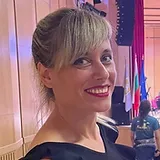
%20Nigeria.webp)
%20United%20States.webp)
"I need to do the MFA now!"
"I need to do the MFA now!"
Admissions Open for Academic Year 2025-2026
Interested in more information?
Submit the form below to receive personalised answers to your questions and additional information about the Master of Fine Arts in Conducting.

Students from the United States qualify for Financial Aid via the FAFSA Federal Student Aid Program
Additional Information: Master of Fine Arts
Tuition and Fees
Total Course Tuition: €34,250
Payment Schedule
Program Deposit: €2,000 (Due to enroll)
Tuition Downpayment: €5,000 (Due June 1, 2025)
Payment 1: €9,250 (Due September 1, 2025)
Payment 2: €9,000 (Due December 1, 2025)
Payment 3: €9,000 (Due March 1, 2026)
Be sure to check out the "Costs of Living in Sofia" dropdown to see how much more affordable Sofia is compared to other major European and American cities.
Financial Aid
Students from the United States can take advantage of the FAFSA Federal Student Aid program. For more information, visit https://studentaid.gov/h/apply-for-aid/fafsa
More Financial Aid Programs:
All students searching for scholarships should search this website: https://www.wemakescholars.com
Norway: Lanekassen - https://www.lanekassen.no/
Colombia: Colfuturo - https://www.colfuturo.org/
South Africa: National Film and Television Foundation (NFVF) - https://www.nfvf.co.za/home/
South Africa: Oppenheimer Trust - https://www.omt.org.za/
Application Requirements:
Required documents to submit an application:
-
video examples of you conducting three (3) different pieces of contrasting styles (these need to be uploaded to a video streaming service such as YouTube or Vimeo so that you can insert links into your application for the Admissions Board to view)
-
1-page Letter of Interest, detailing why you are a viable candidate to be considered by the Admissions Board for the MFA Program
-
copies (Image or PDF) of any music degrees / certifications you have earned
-
CV / Resume (PDF format)
Academic Calendar
Two semesters of course work with a third semester dedicated to the Major Project.
2025-2026 Academic Calendar
Semester 1 - Full-time, presence in Sofia required
Sept. 15, 2025 - Semester 1 commences
Nov. 27 - Thanksgiving Holiday
Dec. 19 - Final day of classes
Dec. 22 - Winter break
Semester 2 - Full-time, presence in Sofia required
Jan. 12, 2026 - Semester 2 commences
May 29 - Final day of classes
May 31 - Semester 2 ends
Semester 3 - Presence in Sofia Optional
June 1, 2026 - Semester 3 commences
Aug. 31 - Semester 3 ends
Costs of Living in Bulgaria
Costs of living in Bulgaria are extremely low in comparison to other major European and American cities. Exponentially cheaper than LA, NYC, London, Valencia, or Boston, while maintaining an extremely comfortable standard of living.
Sofia, Bulgaria compared to other cities that house Conducting Masters degrees:
- 73% lower than New York City
- 65% lower than London
- 64% lower than Los Angeles
- 66% lower than Boston
- 30% lower than Valencia
For more information on comparing prices between cities, visit www.numbeo.com
The Conducting Institute will have a team ready to help students find accommodation in the city centre.
MFA Students who wish to live together will be able to find shared accommodation for as low as €150 - €200 per month.
MFA Students who wish to live alone will be able to find accommodation for as low as €350 - €400 per month.
Visa Requirements
Accepted students from the EU do not need a Visa. They will simply need to establish residency upon arrival in Sofia, which our team will assist with.
Accepted students from outside the EU will require a Type-D Student Visa. Assistance on this process will be provided by our Visa Officer after a student officially enrolls. It is advisable that accepted students from outside the EU begin preparing the Student Visa requirements listed on the Bulgarian Embassy website in their country as soon as possible, as this process can take a substantial amount of time.
Two Unique Training Experiences for Conductors
Master of Fine Arts in Conducting
Master of Fine Arts in Classical, Studio, Contemporary Conducting & Related Recording Technologies. 54 credits.
Conducting Summer Programme
A 3-week fully immersive summer programme for modern conductors. 8 hours of podium time. 6 credits.

